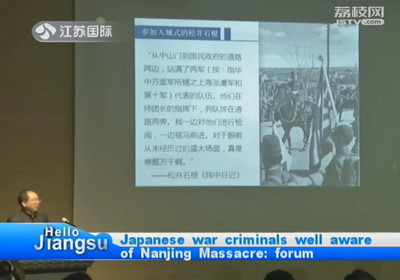The Japanese war criminal Matsui Iwane was well aware of the existence of the Nanjing Massacre and should be held accountable for the war crimes committed by the invading Japanese troops in Nanjing. The remark was made by Zhang Sheng, professor of history with Nanjing University at the opening session of the Zijin Grass Peace Forum that was kicked off Tuesday afternoon at the Memorial Hall of the Victims of the Nanjing Massacre by the Japanese Invaders.
Matsui Iwane was a general in the Imperial Japanese Army and the commander of the expeditionary force sent to China in 1937. After World War II, he was convicted of war crimes by the Far East War Crimes Tribunal and executed by the Allies for his involvement in the Nanking Massacre.
During court hearings, Matsui quibbled that he was not aware of the happening of the massacre in Nanjing.
However, after combing through the files and historical data, Professor Zhang Sheng reviewed the Matsui Iwane’s original diary in which Matsui clearly recorded what he saw and heard in Nanjing, showing that he was responsible for the Nanjing Massacre and was kept informed of the mass slaughter in the six weeks following the fall of Nanjing in December 1937.
Matsui mentioned several times in the diary that the Japanese troops had problems with military disciplines in Nanjing and acknowledged that the Japanese army had been engaged in random killing, arson, pillaging and raping. He therefore had held meetings to reprimand his subordinates. However, in fact, he allowed the war crimes to go unchecked. In addition, the diary of Iinuma Mamoru, chief of staffs of the Shanghai expeditionary army, also corroborated the Nanjing Massacre.
According to the diary, Matsui was in Nanjing on December 18, 1937. The Diary of Iinuma Mamoru also clearly recorded the goings-on of the Nanjing Massacre, as is evidenced by the killing, arson, looting and raping barbarities committed by the Japanese soldiers who also bayoneted and machine-gunned the Chinese POWs at Yanziji. Zhang Sheng believes that no amount of sophistry can distort history, let alone erase the historical truth.
The Zijin Grass Peace Forum was launched with a view to telling history on the basis of historical facts and historical data so that more people will understand the truth of the history about the Nanjing Massacre.
Zijin Grass is a symbol of peace. In the spring of 1939, Yamaguchi Seitaro, a Japanese military surgeon, was commissioned to a Japanese army unit in Nanjing. Years later when he was repatriated back to Japan due to his pacifist remarks, Yamaguchi brought with him 12 seeds of the February orchid he had collected from the Zijin Mountain in Nanjing. He named the flower Zijin Grass after the Zijin Mountain in Nanjing since he could only remember the name of the mountain instead of the grass to express his grief and mourning for and make a confession over the victims of the Nanjing Massacre.
(Source:Jiangsu International Channel)






